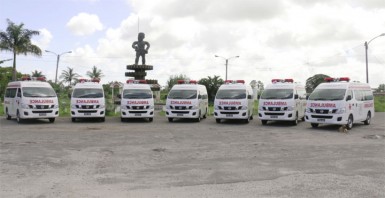Seven ambulances were yesterday set to be distributed to five public hospitals to improve emergency health care across Guyana, while 19 emergency medical technicians (EMTs) are set to graduate today and serve at the Georgetown Public Hospital (GPH).
Five ambulances were handed over to the Minis-ter within the Ministry of Local Government Norman Whittaker for distribution in various regions and two to Chief Executive Officer of the GPH Michael Khan for the city hospital. The recipient hospitals are at Charity, Essequibo Coast; Leonora, West Coast Demerara; Fort Wellington, West Coast Berbice; Port Mourant, Corentyne, Berbice; and the Linden Hospital Complex along with the GPH.
“We are hoping to add capacity to emergency health services and strengthen ambulance services

in several regions,” Health Minister Dr Bheri Ramsaran at a ceremony at the Square of the Revolution. He said the vehicles cost $59,500,000 and were purchased through Associated Industries Limited.
A few weeks ago, a second-hand ambulance was sent to the Kwakwani Hospital in Region 10, while another ambulance was handed over to the Suddie Hospital, which is the largest in Region 2.
According to the minister, “Our records show that new ambulances encounter their first accident in three weeks [of operation]… and we are looking into it because we want drivers not pilots to deliver our patients.”
Whittaker said the distribution of the ambulances was seen an investment intended to improve the quality of health care that is delivered to patients. He said the Local Government Ministry is set to have talks with regional health officials on improving health care services in each region.
The 19 paramedics who are graduating today will be serving at the GPH. Currently, the public hospitals have no EMTs and ambulance service involves simply picking up persons and driving them to the emergency room.
Head of the Emergency Unit at the GPHC Zulfikar Buk said the EMTs would predictably boost the hospital’s response. He added that they are hoping to form a new profession without biases from previous exposures to medicine.
“The plan is actually to create a national emergency medical system and we are starting with two ambulances. It will be overwhelming initially because we cannot respond to everyone but we hope to improve response,” he said.
The EMTs are trained in all aspects of emergency care, especially CPR and first aid, ventilating patients and delivering babies.







